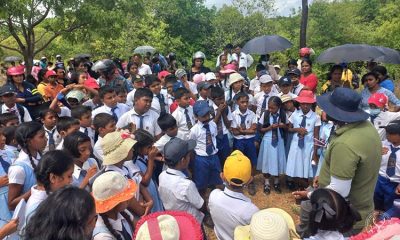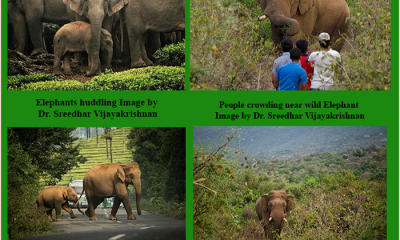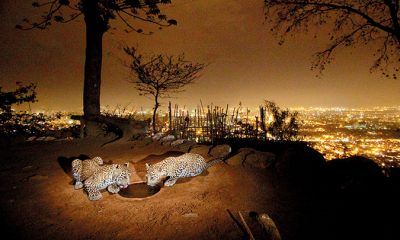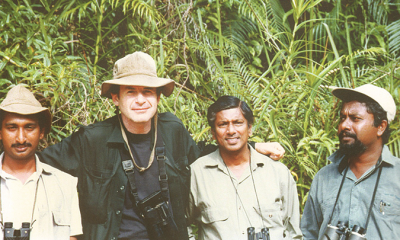Features
Hoffmann’s involvement in the WNPS and some unpleasant incidents in later years

(Excerpted from the authorized biography of Thilo Hoffmann
by Douglas. B. Ranasinghe)
In the development of the Society Thilo received the loyal support of Sam Rajendran, who worked as Office Assistant until 1973. He knew most members personally, and was much liked, an asset to the Society. He was followed by J. Azeez, who worked in that position for many years, with integrity and wide acceptance. Many sound people of eminence were attracted to the General Committee, and other positions were filled by promising youngsters.
There were people such as Leela Dias-Bandaranayake, Chandra Liyanage, Nigel Austin, Charitha Ratwatte and “Ken” Balendra. Chari (C. P.) de Silva was Treasurer for many years. Lalith Senanayake, as the long-standing Honorary Secretary of the Society, was of great help to Thilo, and became a close friend. During the time of his leadership of the Society Thilo Hoffmann was a Director and later the CEO of A. Baur and Co. Ltd. The company provided the infrastructure for his conservation work, and helped the Society in many important ways.
Thilo’s secretary at Baurs, Mrs Yvonne Nadarajah, nee Rogers, most efficiently did all the typing of his innumerable letters, memos, reports, minutes and publications. These were usually dictated after office hours: see the Elapata article. She learned to take down in shorthand most complicated and technical texts. Thilo stresses that without her exceptional devotion and efficiency he would not have been able to achieve what he did.
There were some who claimed that the CEO of a firm which dealt in fertilizers and agrochemicals (amongst other things) could not possibly also be the head of the country’s premier conservation society. Thilo did not see it that way. He explains:
“The responsible use of fertilizers in agriculture worldwide is essential for the ability to feed growing populations and enhance the quality of life. Only the excessive, ill-informed use of fertilizers and chemicals causes environmental damage. Sensible and intelligent conservation has to be combined with realistic and responsible agricultural policies and practices, which on a large scale necessarily involve the use of chemicals.”
When Thilo started at Baurs their special mixtures consisted of up to 50% and more of organic ingredients, such as bone-meal, fish-meal, guano, oil-cakes etc. The prices of these had in the meantime risen to such heights that their use as fertilizers had long become prohibitive.
Alongside his work for the WNPS and conservation, he continued his explorations in the island, surveys of its natural sites and the study of its fauna and flora. This is reflected in various publications. In Loris for example, his personal observations of elephants over the years led him to write the two articles on their habitats, numbers and distribution.
We find that in the issue containing the first there is also by Hoffmann ‘’The Hog Deer’ and ‘The Cats of Sri Lanka’ and in the second: ‘Down the Mahaweli by Boat 114’ – a seven-page survey, much more than an account of adventure. He also pursued his interest in ornithology, and, in parallel with the WNPS, conducted the affairs of the Ceylon Bird Club, as described in a later Chapter.
TWO CRITICAL CHANGES
In 1966, when E. B. Wikramanayake was the President and Thilo was the Secretary, one of the stated objectives of the Society was “to safeguard the interests of legitimate sport”, that is, hunting. Hoffmann was largely responsible for removing that obnoxious clause. Wikramanayake, paying tribute to him on his election as Honorary Life Member in 1981, stated this among his many achievements on behalf of the Society.
It was a hard battle as hunters and their supporters were very strong in the Society. For the first time a poll was taken to ascertain the views of the entire membership. The deletion of the hunting clause was approved by majority vote. In a largely Buddhist country it is remarkable that this change was initiated by Thilo.
During his tenure as President of the Society, Hoffmann suggested that its name be changed from the ‘Wildlife Protection Society of Ceylon’ to the ‘Wildlife and Nature Protection Society of Ceylon’, in view of the fact that wildlife cannot be properly protected without conserving nature in general. This suggestion was given effect to at the Annual General Meeting held on December 14, 1971. The new name (now ending in “Sri Lanka”) is abbreviated `WNPS’.
At the same meeting a resolution to launch a campaign for the preservation of some 20,000 acres of Sinharaja was adopted. The rescue of this rainforest is the subject of the next Chapter. Hoffmann had argued also that without the change the Society would not be able to speak effectively in this matter.
Spreading the message
After the successful battle to save Sinharaja, it became apparent to the WNPS that the message of conservation should be taken to the grassroot level, the village. From time immemorial villagers knew the value of protecting the forest, as much as the wewa and temple. There is a belief among them that every large tree is the abode of a deity and the forest is sacred. When the necessity arose to cut a tree, they lit a lamp and obtained permission from the incumbent deity before it was felled. These old customs and traditions were gradually eroding.
The Rev. Neluwe Gunananda Thero, who helped in saving Sinharaja, met Thilo as President of the WNPS in his office, and made a request that the Society, as the only concerned organization in Sri Lanka, should endeavour to convey the conservation message to the rural population. A similar point had been made earlier by Dr R. L. Spittel, the first Ceylonese President of the Wildlife Protection Society of Ceylon, when in his biography ‘Surgeon of the Wilderness’, he declared:
“Conservation in this island is essentially for the people of Ceylon, and we should not for a moment forget this.” The same idea had been expressed many times by Thilo, both verbally and in writing. The General Committee of the Society appointed an Action Committee. Thilo obtained data from World Wildlife Fund India about the formation of Nature Clubs in schools.
The action committee submitted their proposals to take conservation to village communities through schools, and to publish the first nature magazine in Sinhala. In this manner knowledge of conservation could be imparted, and children encouraged to write about their experiences.
The proposals were approved and the first student Nature Club was declared open in 1976 at Kalutara Maha Vidyalaya, with the assistance of Nimal Liyanarachchi, a science teacher of the school. He had been a student of Douglas B. Ranasinghe, the Secretary of the Action Committee. Thilo Hoffmann, as President, and Ranjen Fernando, as Secretary, of the WNPS participated in this event, and a mango tree was planted in the school premises to commemorate it.

View from Baur’s Building, Colombo, towards Mount Lavinia (1960). At left rear, the new Ceylinco Building under construction, the old building in front of it. Foreground: Clippenberg House, empty space for the Central Bank with British military quarters (right extreme).
In the same year the Sinhala magazine Warana — translation: great tusker — was published, with Russell Kuruppu as editor and Ranasinghe as sub-editor. The concept was an instant success. By 1987 there were 80 Student Nature Clubs in various parts of the country, and from the inception the Department of Education purchased annually 6,400 copies of the biennial magazine for distribution to all government schools in the country. Warana, the first Sinhala nature periodical continues without a break, with Ranasinghe as editor, and has now attained 30 years of successful existence.
In order to further activate interest of school students especially and of all Sinhala- speaking people in birds and their environment, the WNPS in 1978 financed the first book on birds written in Sinhala, namely Asirimat Kurulu Lokaya by Douglas Ranasinghe, and also the Sri Lanka’ Avifaunal List by T. S.U. de Zylva and the same author, which presented the first list of Sinhala names of all the bird species known in Sri Lanka.
As a result of the pioneering action taken by the WNPS headed by Hoffmann, there are at present over 400 Student Nature Clubs in schools in Sri Lanka, and the past members of these have their own NGOs, to promote the conservation movement in urban areas as well as at village level. The patron teachers of the Student Nature Clubs, too, have their separate Patron Teachers Clubs, and a nature magazine, and quietly promote the conservation movement at village level.
In 1976 Hoffmann, as President of WNPS, wrote a handout titled Conserve or Perish, which was distributed throughout the country to schools, to farmers, to administrators and all people young and old. This was done in the hope that those who read the leaflet would look at their own environment, recognize the truths of warnings given in the address and act in a responsible manner for the good of all citizens and the country. 100,000 copies of this leaflet in Sinhala and 15,000 copies in English were printed and distributed.
Problems within
Thilo Hoffmann’s leadership had clearly brought the Society greater respect and influence. Yet there came a time when opposition to his Presidency began to make life difficult for him.It all started with a dispute with the World Wildlife Fund. Thilo tried to uphold the independence and dignity of the Sri Lankan national society against the overbearing attitude of the international giant and its representatives. One of the issues was Hoffmann’s opposition to a First-World ‘elephant expert’. This man proposed, among other things, that all or most wild elephants in Sri Lanka over seven feet tall should be killed.
The situation was used against Thilo by a young woman who had lately formed a dislike towards him. She thought, mistakenly, that the Hoffmanns were partly to blame for the breakdown of her marriage to a close friend and fellow office-bearer in the WNPS. A campaign of vilification against Thilo began to spread, through powerful family connections. It had strong xenophobic undertones: “Why do we need a foreigner as President of the WNPS?”
This was eagerly picked up by a motley range of people of all walks of life, most of whom did not know Thilo Hoffmann, or what he stood for, and also by some with personal grudges. Others who had never before or after shown even the vaguest interest in conservation or wildlife, and knew nothing about it, were recruited into the ranks of opposition, and soon began to make themselves felt.
The drive gathered momentum from one AGM to the next, the campaign, now of personal vilification, spilled over into the press. Particularly, the monthly Tribune carried regular features attacking him ruthlessly and unfairly. There was nothing that could be done against this massed hostility. Eventually it forced Thilo to give up in dismay.
At no stage were any of his actions for nature, wildlife or the Society questioned or criticized. He was accused of being autocratic and a foreigner, and – incongruously – it was held against him that the WWF, an INGO, had declared him ‘persona non grata’. Its Director-General had actually written to a Committee Member that as long as Hoffmann was President of the WNPS they would have no dealings with it.
For many years the WNPS under Thilo had, in fact, been working closely with the WWF – a much younger organization – and was its official representative in Sri Lanka. Its first Director-General was Dr Fritz Vollmar, a Swiss. He and his wife Daniele visited Sri Lanka several times and had a good rapport with both Lalith Senanayake and Thilo.
Then Vollmar was pushed out of his position, which was taken by a Dutch national. The World Wildlife Fund was later renamed the World Wide Fund for Nature.Other allegations about Thilo Hoffmann began to spread and two linger to this day. One is a conflict between his employment and conservation. His response has been noted above. The other is that he “smuggled antiques” out of Sri Lanka. The only matters which could even faintly be related and possibly be a basis for distortion are given below.
Thilo was once held up at Customs for having a geuda with him, during the days of hyper-strict control. It was a birthday present from his wife to his younger sister, who was ill with cancer. The purchase, for Rs 50, was confirmed by Wimalaratna Bros. and the stone given back to him. Another time, too, shortly before, he was searched at the airport and nothing found. On each occasion, the embarrassed officer hinted that there was a tip-off!
Throughout their life in Sri Lanka, Thilo’s wife collected many diverse objects and wares, some of British and Dutch origin. These were sent to Switzerland together with other household goods when the couple was moving there, after Thilo’s retirement, long after the campaign. The official procedures were always followed.
The General Committee with the exception of three members stood loyally by their President. So did the majority of members at various AGMs. The Committee tried hard to persuade Thilo to continue as President. But in 1982 he declined to offer himself for re-election. The workload at Baurs, too, had greatly increased, and the lessening of one set of responsibilities would be a relief.
Afterwards
The Society later elected him an Honorary Life Member. In 1997 it presented to him a plaque on which is recorded “grateful appreciation of services rendered from 1960-1997”. Thilo continued for many years as ex-officio member of the General Committee of the Society. His interest and active involvement in conservation issues has never ceased to this day.
Features
Crucial test for religious and ethnic harmony in Bangladesh
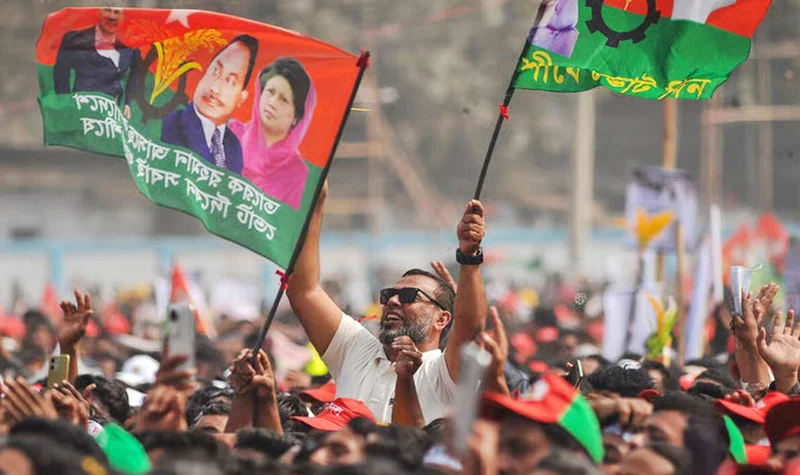
 Will the Bangladesh parliamentary election bring into being a government that will ensure ethnic and religious harmony in the country? This is the poser on the lips of peace-loving sections in Bangladesh and a principal concern of those outside who mean the country well.
Will the Bangladesh parliamentary election bring into being a government that will ensure ethnic and religious harmony in the country? This is the poser on the lips of peace-loving sections in Bangladesh and a principal concern of those outside who mean the country well.
The apprehensions are mainly on the part of religious and ethnic minorities. The parliamentary poll of February 12th is expected to bring into existence a government headed by the Bangladesh Nationalist Party (BNP) and the Islamist oriented Jamaat-e-Islami party and this is where the rub is. If these parties win, will it be a case of Bangladesh sliding in the direction of a theocracy or a state where majoritarian chauvinism thrives?
Chief of the Jamaat, Shafiqur Rahman, who was interviewed by sections of the international media recently said that there is no need for minority groups in Bangladesh to have the above fears. He assured, essentially, that the state that will come into being will be equable and inclusive. May it be so, is likely to be the wish of those who cherish a tension-free Bangladesh.
The party that could have posed a challenge to the above parties, the Awami League Party of former Prime Minister Hasina Wased, is out of the running on account of a suspension that was imposed on it by the authorities and the mentioned majoritarian-oriented parties are expected to have it easy at the polls.
A positive that has emerged against the backdrop of the poll is that most ordinary people in Bangladesh, be they Muslim or Hindu, are for communal and religious harmony and it is hoped that this sentiment will strongly prevail, going ahead. Interestingly, most of them were of the view, when interviewed, that it was the politicians who sowed the seeds of discord in the country and this viewpoint is widely shared by publics all over the region in respect of the politicians of their countries.
Some sections of the Jamaat party were of the view that matters with regard to the orientation of governance are best left to the incoming parliament to decide on but such opinions will be cold comfort for minority groups. If the parliamentary majority comes to consist of hard line Islamists, for instance, there is nothing to prevent the country from going in for theocratic governance. Consequently, minority group fears over their safety and protection cannot be prevented from spreading.
Therefore, we come back to the question of just and fair governance and whether Bangladesh’s future rulers could ensure these essential conditions of democratic rule. The latter, it is hoped, will be sufficiently perceptive to ascertain that a Bangladesh rife with religious and ethnic tensions, and therefore unstable, would not be in the interests of Bangladesh and those of the region’s countries.
Unfortunately, politicians region-wide fall for the lure of ethnic, religious and linguistic chauvinism. This happens even in the case of politicians who claim to be democratic in orientation. This fate even befell Bangladesh’s Awami League Party, which claims to be democratic and socialist in general outlook.
We have it on the authority of Taslima Nasrin in her ground-breaking novel, ‘Lajja’, that the Awami Party was not of any substantial help to Bangladesh’s Hindus, for example, when violence was unleashed on them by sections of the majority community. In fact some elements in the Awami Party were found to be siding with the Hindus’ murderous persecutors. Such are the temptations of hard line majoritarianism.
In Sri Lanka’s past numerous have been the occasions when even self-professed Leftists and their parties have conveniently fallen in line with Southern nationalist groups with self-interest in mind. The present NPP government in Sri Lanka has been waxing lyrical about fostering national reconciliation and harmony but it is yet to prove its worthiness on this score in practice. The NPP government remains untested material.
As a first step towards national reconciliation it is hoped that Sri Lanka’s present rulers would learn the Tamil language and address the people of the North and East of the country in Tamil and not Sinhala, which most Tamil-speaking people do not understand. We earnestly await official language reforms which afford to Tamil the dignity it deserves.
An acid test awaits Bangladesh as well on the nation-building front. Not only must all forms of chauvinism be shunned by the incoming rulers but a secular, truly democratic Bangladesh awaits being licked into shape. All identity barriers among people need to be abolished and it is this process that is referred to as nation-building.
On the foreign policy frontier, a task of foremost importance for Bangladesh is the need to build bridges of amity with India. If pragmatism is to rule the roost in foreign policy formulation, Bangladesh would place priority to the overcoming of this challenge. The repatriation to Bangladesh of ex-Prime Minister Hasina could emerge as a steep hurdle to bilateral accord but sagacious diplomacy must be used by Bangladesh to get over the problem.
A reply to N.A. de S. Amaratunga
A response has been penned by N.A. de S. Amaratunga (please see p5 of ‘The Island’ of February 6th) to a previous column by me on ‘ India shaping-up as a Swing State’, published in this newspaper on January 29th , but I remain firmly convinced that India remains a foremost democracy and a Swing State in the making.
If the countries of South Asia are to effectively manage ‘murderous terrorism’, particularly of the separatist kind, then they would do well to adopt to the best of their ability a system of government that provides for power decentralization from the centre to the provinces or periphery, as the case may be. This system has stood India in good stead and ought to prove effective in all other states that have fears of disintegration.
Moreover, power decentralization ensures that all communities within a country enjoy some self-governing rights within an overall unitary governance framework. Such power-sharing is a hallmark of democratic governance.
Features
Celebrating Valentine’s Day …

 Valentine’s Day is all about celebrating love, romance, and affection, and this is how some of our well-known personalities plan to celebrate Valentine’s Day – 14th February:
Valentine’s Day is all about celebrating love, romance, and affection, and this is how some of our well-known personalities plan to celebrate Valentine’s Day – 14th February:
Merlina Fernando (Singer)
Yes, it’s a special day for lovers all over the world and it’s even more special to me because 14th February is the birthday of my husband Suresh, who’s the lead guitarist of my band Mission.
We have planned to celebrate Valentine’s Day and his Birthday together and it will be a wonderful night as always.
We will be having our fans and close friends, on that night, with their loved ones at Highso – City Max hotel Dubai, from 9.00 pm onwards.
Lorensz Francke (Elvis Tribute Artiste)
On Valentine’s Day I will be performing a live concert at a Wealthy Senior Home for Men and Women, and their families will be attending, as well.
I will be performing live with romantic, iconic love songs and my song list would include ‘Can’t Help falling in Love’, ‘Love Me Tender’, ‘Burning Love’, ‘Are You Lonesome Tonight’, ‘The Wonder of You’ and ‘’It’s Now or Never’ to name a few.
To make Valentine’s Day extra special I will give the Home folks red satin scarfs.
Emma Shanaya (Singer)
I plan on spending the day of love with my girls, especially my best friend. I don’t have a romantic Valentine this year but I am thrilled to spend it with the girl that loves me through and through. I’ll be in Colombo and look forward to go to a cute cafe and spend some quality time with my childhood best friend Zulha.
JAYASRI

Emma-and-Maneeka
This Valentine’s Day the band JAYASRI we will be really busy; in the morning we will be landing in Sri Lanka, after our Oman Tour; then in the afternoon we are invited as Chief Guests at our Maris Stella College Sports Meet, Negombo, and late night we will be with LineOne band live in Karandeniya Open Air Down South. Everywhere we will be sharing LOVE with the mass crowds.
Kay Jay (Singer)
I will stay at home and cook a lovely meal for lunch, watch some movies, together with Sanjaya, and, maybe we go out for dinner and have a lovely time. Come to think of it, every day is Valentine’s Day for me with Sanjaya Alles.
Maneka Liyanage (Beauty Tips)
On this special day, I celebrate love by spending meaningful time with the people I cherish. I prepare food with love and share meals together, because food made with love brings hearts closer. I enjoy my leisure time with them — talking, laughing, sharing stories, understanding each other, and creating beautiful memories. My wish for this Valentine’s Day is a world without fighting — a world where we love one another like our own beloved, where we do not hurt others, even through a single word or action. Let us choose kindness, patience, and understanding in everything we do.
Janaka Palapathwala (Singer)
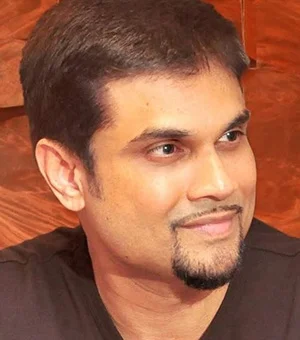
Janaka
Valentine’s Day should not be the only day we speak about love.
From the moment we are born into this world, we seek love, first through the very drop of our mother’s milk, then through the boundless care of our Mother and Father, and the embrace of family.
Love is everywhere. All living beings, even plants, respond in affection when they are loved.
As we grow, we learn to love, and to be loved. One day, that love inspires us to build a new family of our own.
Love has no beginning and no end. It flows through every stage of life, timeless, endless, and eternal.
Natasha Rathnayake (Singer)
We don’t have any special plans for Valentine’s Day. When you’ve been in love with the same person for over 25 years, you realise that love isn’t a performance reserved for one calendar date. My husband and I have never been big on public displays, or grand gestures, on 14th February. Our love is expressed quietly and consistently, in ordinary, uncelebrated moments.
With time, you learn that love isn’t about proving anything to the world or buying into a commercialised idea of romance—flowers that wilt, sweets that spike blood sugar, and gifts that impress briefly but add little real value. In today’s society, marketing often pushes the idea that love is proven by how much money you spend, and that buying things is treated as a sign of commitment.
Real love doesn’t need reminders or price tags. It lives in showing up every day, choosing each other on unromantic days, and nurturing the relationship intentionally and without an audience.
This isn’t a judgment on those who enjoy celebrating Valentine’s Day. It’s simply a personal choice.
Melloney Dassanayake (Miss Universe Sri Lanka 2024)
 I truly believe it’s beautiful to have a day specially dedicated to love. But, for me, Valentine’s Day goes far beyond romantic love alone. It celebrates every form of love we hold close to our hearts: the love for family, friends, and that one special person who makes life brighter. While 14th February gives us a moment to pause and celebrate, I always remind myself that love should never be limited to just one day. Every single day should feel like Valentine’s Day – constant reminder to the people we love that they are never alone, that they are valued, and that they matter.
I truly believe it’s beautiful to have a day specially dedicated to love. But, for me, Valentine’s Day goes far beyond romantic love alone. It celebrates every form of love we hold close to our hearts: the love for family, friends, and that one special person who makes life brighter. While 14th February gives us a moment to pause and celebrate, I always remind myself that love should never be limited to just one day. Every single day should feel like Valentine’s Day – constant reminder to the people we love that they are never alone, that they are valued, and that they matter.
I’m incredibly blessed because, for me, every day feels like Valentine’s Day. My special person makes sure of that through the smallest gestures, the quiet moments, and the simple reminders that love lives in the details. He shows me that it’s the little things that count, and that love doesn’t need grand stages to feel extraordinary. This Valentine’s Day, perfection would be something intimate and meaningful: a cozy picnic in our home garden, surrounded by nature, laughter, and warmth, followed by an abstract drawing session where we let our creativity flow freely. To me, that’s what love is – simple, soulful, expressive, and deeply personal. When love is real, every ordinary moment becomes magical.
Noshin De Silva (Actress)
Valentine’s Day is one of my favourite holidays! I love the décor, the hearts everywhere, the pinks and reds, heart-shaped chocolates, and roses all around. But honestly, I believe every day can be Valentine’s Day.
It doesn’t have to be just about romantic love. It’s a chance to celebrate love in all its forms with friends, family, or even by taking a little time for yourself.
Whether you’re spending the day with someone special or enjoying your own company, it’s a reminder to appreciate meaningful connections, show kindness, and lead with love every day.
And yes, I’m fully on theme this year with heart nail art and heart mehendi design!
Wishing everyone a very happy Valentine’s Day, but, remember, love yourself first, and don’t forget to treat yourself.
Sending my love to all of you.
Features
Banana and Aloe Vera

 To create a powerful, natural, and hydrating beauty mask that soothes inflammation, fights acne, and boosts skin radiance, mix a mashed banana with fresh aloe vera gel.
To create a powerful, natural, and hydrating beauty mask that soothes inflammation, fights acne, and boosts skin radiance, mix a mashed banana with fresh aloe vera gel.
This nutrient-rich blend acts as an antioxidant-packed anti-ageing treatment that also doubles as a nourishing, shiny hair mask.
* Face Masks for Glowing Skin:
Mix 01 ripe banana with 01 tablespoon of fresh aloe vera gel and apply this mixture to the face. Massage for a few minutes, leave for 15-20 minutes, and then rinse off for a glowing complexion.
* Acne and Soothing Mask:
Mix 01 tablespoon of fresh aloe vera gel with 1/2 a mashed banana and 01 teaspoon of honey. Apply this mixture to clean skin to calm inflammation, reduce redness, and hydrate dry, sensitive skin. Leave for 15-20 minutes, and rinse with warm water.
* Hair Treatment for Shine:
Mix 01 fresh ripe banana with 03 tablespoons of fresh aloe vera gel and 01 teaspoon of honey. Apply from scalp to ends, massage for 10-15 minutes and then let it dry for maximum absorption. Rinse thoroughly with cool water for soft, shiny, and frizz-free hair.
-

 Features5 days ago
Features5 days agoMy experience in turning around the Merchant Bank of Sri Lanka (MBSL) – Episode 3
-

 Business6 days ago
Business6 days agoZone24x7 enters 2026 with strong momentum, reinforcing its role as an enterprise AI and automation partner
-

 Business5 days ago
Business5 days agoRemotely conducted Business Forum in Paris attracts reputed French companies
-

 Business5 days ago
Business5 days agoFour runs, a thousand dreams: How a small-town school bowled its way into the record books
-

 Business5 days ago
Business5 days agoComBank and Hayleys Mobility redefine sustainable mobility with flexible leasing solutions
-

 Business2 days ago
Business2 days agoAutodoc 360 relocates to reinforce commitment to premium auto care
-

 Business6 days ago
Business6 days agoHNB recognized among Top 10 Best Employers of 2025 at the EFC National Best Employer Awards
-

 Business6 days ago
Business6 days agoGREAT 2025–2030: Sri Lanka’s Green ambition meets a grid reality check




